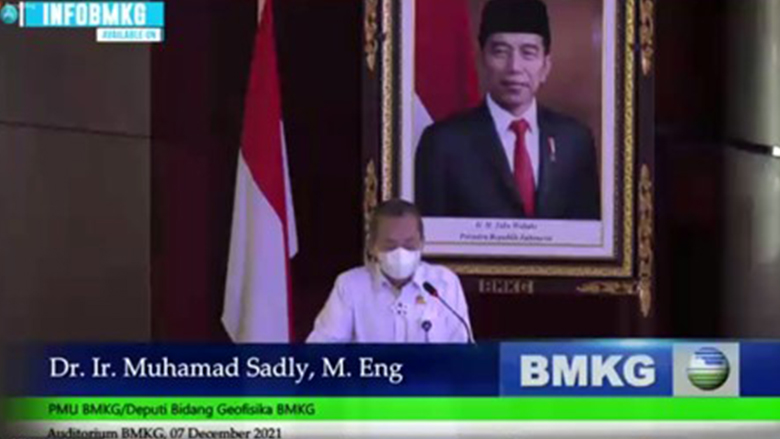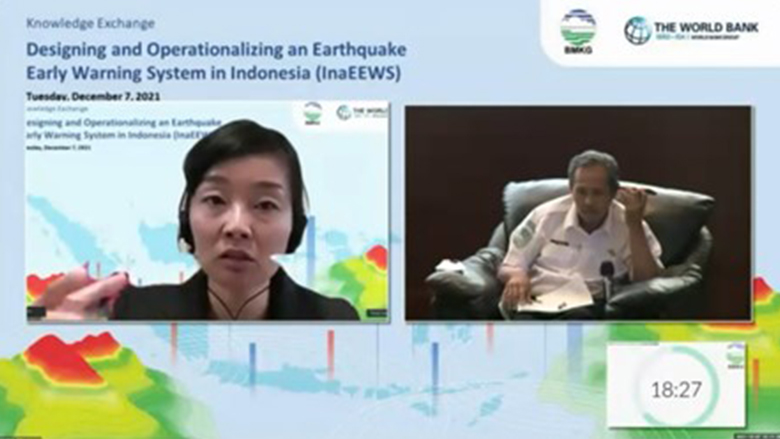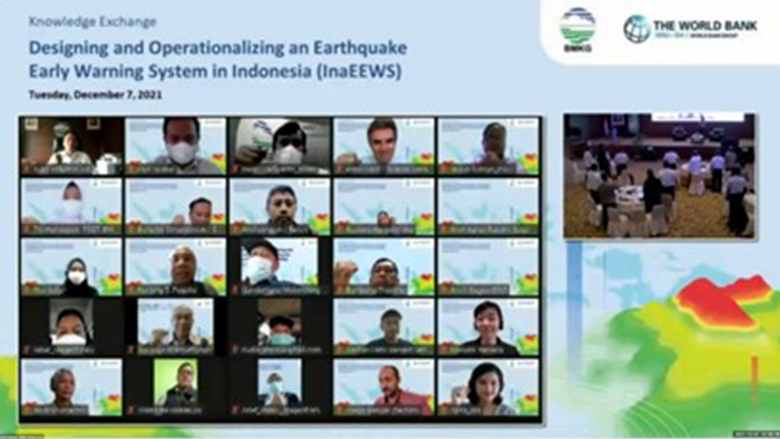The Government of Indonesia, with partners including the World Bank, is working on the establishment of an Earthquake Early Warning System in Indonesia (InaEEWS) to improve the country’s preparedness for geophysical hazards. Support through the Japan-World Bank Program for Mainstreaming Disaster Risk Management in Developing Countries is providing global expertise, including from Japan, and capacity building initiatives to support Indonesia’s efforts to establish the InaEEWS. For example, on December 7th, 2021, the Indonesian Agency for Meteorology, Climatology and Geophysics (BMKG) hosted a workshop on the “Designing and Operationalizing an Earthquake Early Warning System (InaEEWS)” in partnership with the World Bank and technical experts, including from Japan.

The workshop was held with more than 150 participants (online & offline) comprised of experts and practitioners of earthquake early warning system from Indonesian government agencies and universities, the World Bank specialists, and expert presenters from Japan, Mexico, and Taiwan. After the opening and remarks, the overview of InaEEWS was presented by BMKG, with their vision and mission through the establishment of InaEEWS. The presentation and discussion section involved key experts from the Institute of Geophysics, National Autonomous University of Mexico (UNAM) in Mexico, National Taiwan University (NTU), Taiwan Central Weather Bureau (CWB), and Kyoto University in Japan.
The EEWS expert from UNAM presented on the progress of Mexico EEWS and country efforts to improve earthquake hazard awareness, followed by the presentation by the experts from NTU and CWB on the overview of EEWS development in Taiwan, its progress, and technical challenges. From Japan, the EEWS expert from the Disaster Prevention Research Institute, Kyoto University, shared the lessons-learned of Japan’s continuous efforts to improve its EEWS, especially in technical and operational aspects.

During the workshop, the experts exchanged their opinions with intensive discussion to ensure the implementation of InaEEWS for the safety of people and infrastructures and assets in Indonesia. The implementation of EEWS in Indonesia poses a big challenge due to the wide coverage area and different infrastructure capabilities in each region. Together with the examples of Mexico and Taiwan, the development process of EEWS in Japan were shared for the further development of InaEEWS. Some of the highlights from the discussion and recommendation session include: 1) The time signs communication and synchronization network are several main infrastructures that should be considered in the development of InaEEWS; 2) Public education is highly required to support the success of InaEEWS; and 3) Regulations/legal basis to support the development and implementation of InaEEWS is required.
This knowledge exchange activity provided BMKG additional practical global knowledge, operational lessons learned, and diverse technical perspectives to inform the preparation and implementation of InaEEWS. It will help Indonesia to identify the next steps of the development of InaEEWS, including with support from the World Bank-financed Indonesia Disaster Resilience Initiatives Project.
